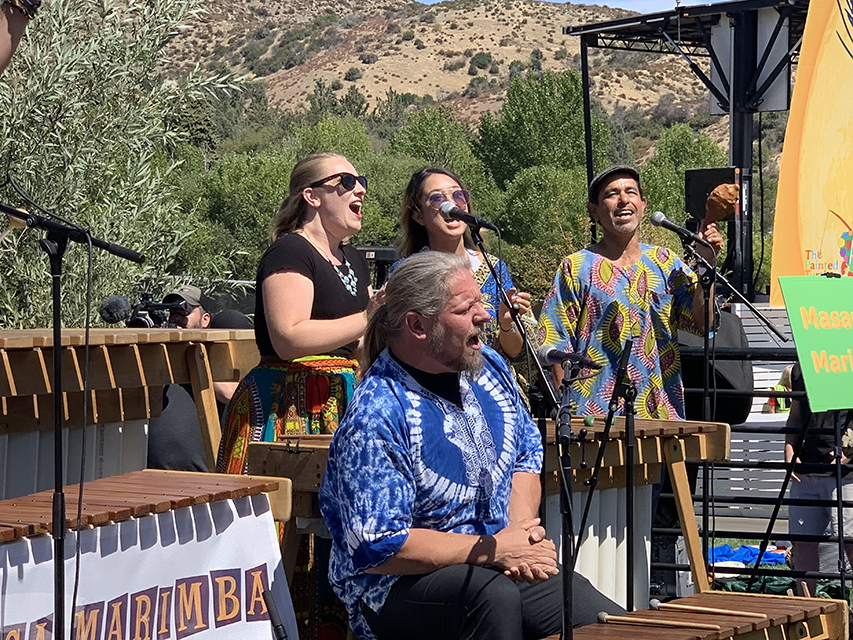Music Professor Ric Alviso and His Ensemble Share Stage with Neil Young and Norah Jones
On a quest to learn more about the roots of American music, CSUN professor of world music Ric Alviso found himself looking far beyond its shores — to Africa.
As he explored and learned a variety of traditional instruments from countries such as Zimbabwe and Senegal, Alviso discovered a remarkable truth: African music provides the foundation of much of modern American music, he said.
With a background in piano, Alviso set out to study the mbira — a traditional African instrument Westerners sometimes call a “thumb-piano” — in Zimbabwe in 1998 for his Ph.D. in ethnomusicology. During his research, he was first exposed to the music of marimbas — large, rich-sounding percussion instruments related to the xylophone. (The marimba has long been popular in the U.S. as well, in orchestras, percussion ensembles and in drumline field shows.)
On Sept. 14, Alviso and his marimba ensemble Masanga brought the sounds of Zimbabwe to The Painted Turtle camp in Lake Hughes, Calif., where they shared the stage with Grammy Award-winning artists Neil Young, Norah Jones and Father John Misty for “Harvest Moon: A Gathering” benefit concert.
The event benefited The Painted Turtle, a camp for children with chronic or life-threatening medical conditions, and The Bridge School, which provides free education to children with severe speech and physical disabilities. CSUN alumna Page Adler ’96 (M.A., Educational Psychology and Counseling) co-founded the camp with her husband, award-winning music producer Lou Adler, and other philanthropists including actors Paul Newman and Jami Gertz and NBA coach Larry Brown.
In fall 2000, with a brand-new set of marimbas, Alviso forged the nine-person Masanga ensemble with the vision of sharing the music and culture he absorbed during his years in Zimbabwe, with the CSUN community and beyond.
“If you look at American music as a soup or salad, undeniably the most important ingredient is African rhythms,” Alviso said. “So, if you really want to know what’s at the heartbeat of American music, it inevitably leads you to Africa.”
Comprised of Alviso and eight CSUN alumni, all former students in his marimba class on campus, the Masanga ensemble plays a set of seven marimbas along with vocals, drums and other percussion, saxophone and trumpet.
Since their inception, Masanga has reached the ears of thousands, performing hundreds of shows in venues such as the Hollywood Bowl and the Ford Amphitheater.
Their name is derived from a Shona (one of the national languages of Zimbabwe) word that means “the coming together of rivers or roads.” Masanga has centered its sound on the dynamic fusion of traditional African music with Alviso’s background in Latin and American music.
Alviso’s journey to playing Zimbabwean marimba music began with his admiration of American music. Whether from his older brother’s collection of 1970s pop and rock records, or from his father’s interest in American jazz and swing, Alviso developed a desire to dig deeper into the nation’s musical history.
Masanga isn’t the only marimba ensemble based in the U.S., but they are a rarity in the region — most other U.S.-based marimba groups are located in cities in the Pacific Northwest. Without the input of other, more experienced groups, Alviso had to get creative as he developed Masanga’s unique repertoire.
“It was natural for us to spread beyond Zimbabwe and try to play marimba music from other parts of the world,” Alviso said.
Over centuries, along with many aspects of African culture, marimba music has spread across the globe, even reaching Latin American nations such as Guatemala, Colombia and Mexico.
After growing up around the Mexican music of his parents, Alviso took the Latin influence deeply embedded in his own musical knowledge and incorporated Mexican marimba music and other well-known Latin songs into Masanga’s repertoire.
Among the melodies in the group’s now-extensive repertoire, Masanga has played marimba arrangements of contemporary pop tunes such as Shakira’s “Waka Waka” and MGMT’s “Kids” to welcome audiences who are new to marimba music.
Their concert gig at the The Painted Turtle was a homecoming of sorts, as the group has played at the camp for the past eight years.
“We’ve felt so good playing there because the enthusiasm of the kids who are there is just completely off the charts,” Alviso said. “And [Neil Young, Norah Jones and Father John Misty] are just incredible artists. So, we’re glad that they asked us to be a part of this festival.”


 experience
experience